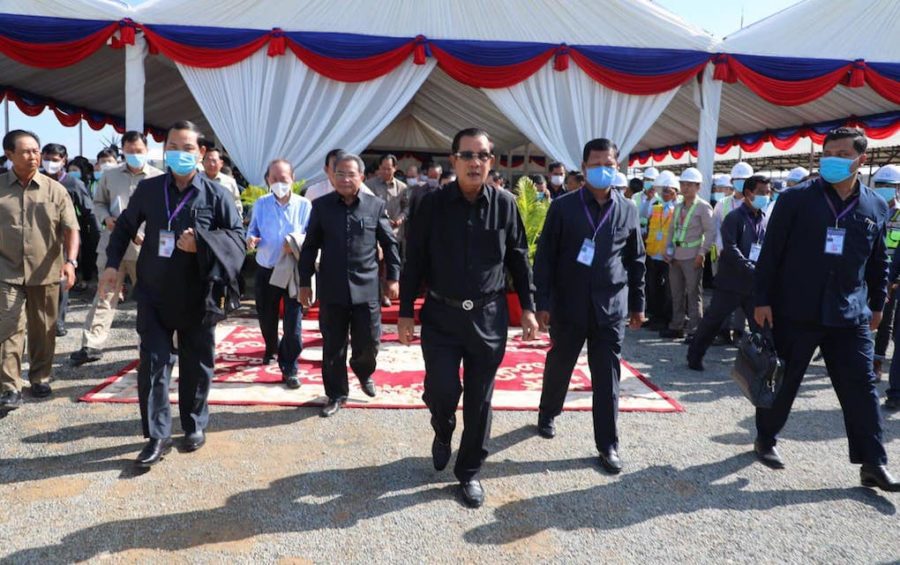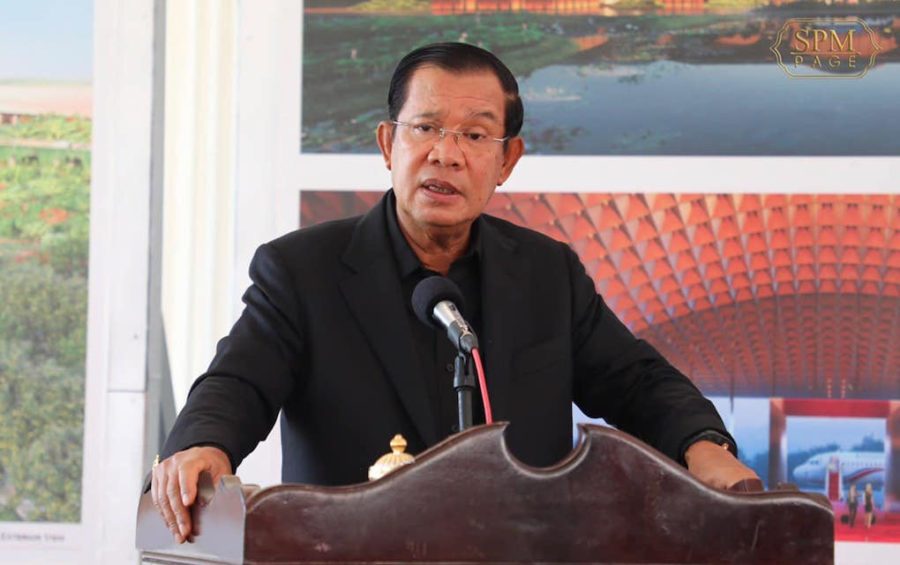Prime Minister Hun Sen on Monday said the government would distribute about $25 million per month to assist families registered in the IDPoor social benefits system as the country struggles through the pandemic-driven economic downturn.
Speaking at the construction site of a $1.5 billion airport planned for Kandal province, Hun Sen said he would formally announce a social aid package of about $25 million per month on Wednesday, which is intended to aid more than 600,000 families designated as poor by the social registry system created by the Planning Ministry and foreign development agencies.
When asked when families will receive payments and how long the monthly aid would last, spokesmen for the ministries of Planning and Finance told VOD to wait for the official announcement on Wednesday.
“At the moment, we have the ability to use current income, which is the normal income,” Hun Sen said, referring to government tax revenue.
During the global Covid-19 pandemic, government revenue has stayed at about $400 million per month this year, and about $200 million of the budget is spent on civil servant salaries, he said.
Hun Sen also dismissed rumors he said were circulating on Facebook that claimed the government would not be able to cover salaries for public employees next year because of the troubled economy.
“I am just clarifying that Covid-19 cannot kill Hun Sen’s government,” he said. “Please, do not look down on Hun Sen’s government, do not look down on Hun Sen’s government. If Hun Sen does not have the ability, [Hun Sen] could not stand on the political stage for the past 41 years.”
The prime minister has led Cambodia since 1985.
He said the government has $3.5 billion in domestic reserves available, in addition to $20 billion in international reserves, though he did not explain the source of either.

The World Bank forecasted in its May economic update that Cambodia would see negative growth this year for the first time since 1994. In addition, public debt is expected to rise to 35 percent of GDP by 2022, given current projections amid the economic crisis.
Meas Sok Sensan, spokesman for the Finance Ministry, confirmed that the government’s monthly revenue was about $400 million per month this year, which he said was lower than its monthly revenue of $500 million before the virus hit.
The spokesman said the government is aiming to first ensure that people’s immediate livelihood needs are met and later help them improve their careers.
“The government is trying to help people and not let anyone die or starve to death,” he said. “We can not provide fish to people every day, so later on, we will teach people how to fish.”
The premier’s speech follows the government’s decision earlier this month to implement a program that would assist families covered by the IDPoor system.
Under the sub-decree, signed by Hun Sen and Finance Minister Aun Pornmoniroth on June 12, families who hold valid equity cards under the IDPoor program, and whose identities can be verified, will be eligible for financial support during the height of the Covid-19 economic downturn.
According to the sub-decree, eligible families in Phnom Penh will receive 120,000 riel ($30) per family per month, as well as a payment of 52,000 riel ($13) per family member for families categorized by IDPoor as “very poor” and 36,000 riel ($9) per member for families categorized as “poor.”
Families in Phnom Penh’s outskirts would also receive 120,000 riel per family, as well as payments of 40,000 riel ($10) per member in “very poor” families or 28,000 riel ($7) per member in “poor” families. In rural areas, families will receive 80,000 riel ($20) per family, plus 24,000 riel ($6) per member in “very poor” families and 16,000 riel ($4) per member in “poor” families.
When asked how many people were registered in the IDPoor system as of this year, Planning Ministry spokesman Nop Kannavuth referred to a post on the ruling CPP’s website from June 3, which states that there were more than 560,000 families registered in the system, comprising more than 2 million people.
While Hun Sen said more than 600,000 families will be assisted, the Planning Ministry’s IDPoor database, which includes records taken from 2017 to 2019, identified some 528,000 families as either “poor” or “very poor.”
Kannavuth said payments would be distributed to families through Wing money transfer services and that he expected the process to go smoothly because officials had instructed local authorities on clearly identifying families who are eligible for the program.
“I think that there will not be any problems because the money will go directly to the hands of the people,” Kannavuth said.
Social researcher Meas Nee said providing for the nation’s most vulnerable was the government’s responsibility, but he noted that the measure came a bit late and was based on a poor collection of data on low-income families.
“The state’s management of the data is not strong, so when the crisis happens, we start to throw out our arms to help each other along, and we don’t know which data is appropriate to consider and [therefore] how to prepare the guidelines for assistance,” Nee said. “This is a lesson that I think the government needs to learn and do whatever it takes to strengthen the data system.”












